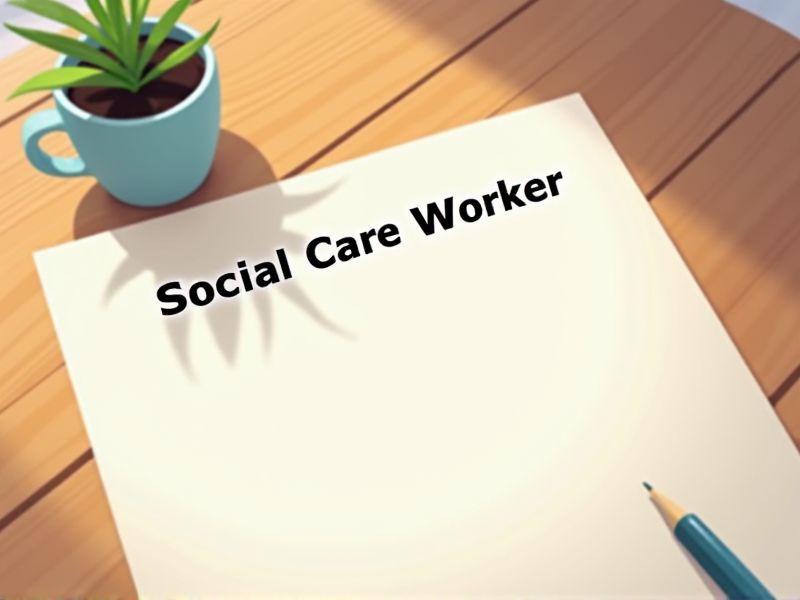
Social care workers interact with vulnerable populations requiring specialized knowledge and skills. Certifications ensure these professionals have the necessary training to effectively manage diverse challenges while adhering to legal and ethical standards. They enhance the ability to deliver high-quality care and improve client outcomes by providing credibility and proficiency. Here are essential certifications relevant to a career in social care work.
Care Certificate
The Care Certificate establishes a standardized foundation of skills and knowledge for social care workers, enhancing the overall quality of care provided to service users. By ensuring every worker meets minimum competencies, it reduces inconsistencies in care practices and ensures safer delivery of services. It builds workers' confidence, leading to increased job satisfaction and potentially lower staff turnover. Adhering to this certification helps organizations comply with regulatory standards, reducing the likelihood of legal issues or care-related incidents.
NVQ Level 2 in Health and Social Care
Completing an NVQ Level 2 in Health and Social Care equips social care workers with foundational knowledge essential for effective service delivery. This qualification ensures workers understand critical aspects like safeguarding and health and safety, directly influencing the quality of care provided. Employers often require this certification to meet regulatory standards and demonstrate compliant practice. Training at this level increases confidence in performing tasks safely and responsibly, impacting overall care outcomes positively.
NVQ Level 3 in Health and Social Care
NVQ Level 3 in Health and Social Care provides essential skills and knowledge tailored to the demanding environment social care workers operate in. This qualification ensures individuals understand regulatory requirements and ethical standards, enabling them to deliver care responsibly. It enhances practical competence through hands-on experience, directly impacting the quality of care and support provided to clients. The certification increases employability and career advancement opportunities within the social care sector.
Mental Health First Aid Certification
Social care workers often encounter individuals experiencing emotional distress; Mental Health First Aid Certification equips them with skills to provide initial support. Certification helps workers recognize early signs of mental health issues, facilitating timely intervention. Knowledge gained from certification enhances worker confidence, reducing burnout by promoting effective stress management techniques. Possession of Mental Health First Aid Certification improves organizational trust and outcomes by ensuring a professional approach to mental health crises.
Safeguarding Adults and Children Certification
Safeguarding Adults and Children Certification equips social care workers with the necessary skills to identify signs of abuse and neglect, which directly prevents harm and enhances safety. Regulatory compliance requires social care workers to maintain such certifications, ensuring that organizations meet legal and ethical standards. Obtaining the certification increases a worker's competency in handling sensitive situations, thereby fostering trust among clients and their families. Certified social care workers contribute to a safer care environment, which can lead to improved outcomes in the social care system.
Basic Life Support (BLS) Certification
Gaining Basic Life Support (BLS) Certification equips social care workers with essential skills to respond effectively in medical emergencies. This certification increases the worker's confidence and competence in administering CPR, which can significantly improve survival rates during cardiac arrest incidents. Employers often require BLS certification to ensure that care providers meet safety and quality care standards. BLS training promotes a safer work environment by empowering social care workers with vital knowledge to mitigate life-threatening situations.
Dementia Care Certification
Dementia care certification provides social care workers with specialized skills to better understand and address the unique needs of individuals with dementia. With certification, workers can implement effective communication strategies, improving the quality of care and reducing stress for both patients and caregivers. Certified workers are more likely to recognize early signs of dementia-related complications, allowing for timely interventions. The certification enhances credibility and trust, leading to higher standards in social care services and better outcomes for those affected by dementia.
Equality and Diversity Training Certificate
The Equality and Diversity Training Certificate equips social care workers with the skills to provide unbiased support to diverse populations, which results in improved care outcomes. Understanding varying cultural backgrounds and personal identities helps in preventing discrimination, enhancing the quality of service offered. Legal compliance with anti-discrimination laws is essential, and such training ensures workers are educated in relevant regulations, reducing risk for both caregivers and organizations. Equipping workers with this knowledge also fosters an inclusive environment, leading to higher employee satisfaction and retention within social care settings.
Medication Management Certification
Medication management certification is crucial for social care workers because it ensures the safe administration of medications, reducing the risk of medication errors and adverse drug interactions. Certification provides them with essential knowledge about pharmacology, enhancing their ability to monitor and identify potential side effects or complications in clients. Proper training through certification empowers social care workers to comply with legal and regulatory standards, thus safeguarding their professional practice. Moreover, such certification can improve trust and confidence among clients and their families in the care provided.
Motivational Interviewing Certification
Motivational Interviewing Certification enhances a social care worker's ability to effectively facilitate behavior change in clients by developing essential communication skills. This certification reduces client resistance by fostering a collaborative environment, promoting a deeper understanding and acceptance of clients' perspectives. It increases the likelihood of successful outcomes by equipping workers with evidence-based techniques to empower clients towards self-directed change. Social care workers with this credential demonstrate a commitment to professional development and ethical practice, boosting their credibility and client trust.
Summary
When you earn certifications as a Social Care Worker, improved professional credibility and trust often follow. With validation of skillsets, your employment opportunities may increase. Enhanced knowledge through certification can boost your effectiveness in interventions and client relations. Employers often recognize certifications as a mark of commitment, leading to potential career advancement.
